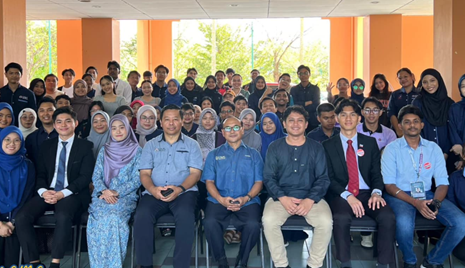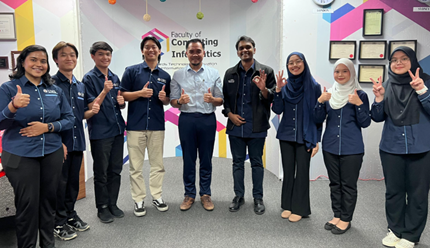Policies
1) UMS Procurement Policy
2) UMS Sustainable Investment Policy
3) UMS Sustainable Energy Policy
4) UMS Sustainable Waste Management Policy
5) UMS Occupational Safety and Health Policy
6) UMS Equality, Diversity, Inclusion and Anti-Discrimination Policy
Equality, Diversity and Inclusion (EDI) Governance Structure
Universiti Malaysia Sabah (UMS) recognises the critical role of institutional leadership in fostering a culture grounded in equality, diversity, inclusion, and respect for human rights.
In support of this commitment, UMS has established key governance structures, including the Legal Advisor’s Office (Pejabat Penasihat Undang-Undang), along with other relevant university committees and bodies tasked with upholding inclusive values, advising on related policies, and ensuring compliance with national and institutional frameworks.
Legal Officer’s Core Responsibilities Include:
- Advising the University Executive and Senate on matters related to equity, non-discrimination, and human rights;- Coordinating and supporting the implementation of inclusive policies, programmes, and training across faculties and departments;
- Monitoring compliance with relevant Malaysian legislation, such as:
- Federal Constitution (Article 8) – Equality before the law,
- Employment Act 1955 – Equal opportunity in the workplace,
- Persons with Disabilities Act 2008, and
- Malaysian Human Rights Commission Act 1999;
- Reviewing campus climate, collecting disaggregated data, and reporting on trends and interventions related to equity and inclusion;
- Collaborating with the Human Resource Division, Student Affairs Department, and the Legal Office on institutional responses and continuous improvement.
Link to Staff and Student Disciplinary Committees
The Staff Disciplinary Committee: https://www.ums.edu.my/ppuu/images/documentppuu/Bidang_Kuasa_Tatatertib_2018_Lampiran_A_151018_-_Yenney.pdf and Student Disciplinary Committees: https://www.ums.edu.my/ppuu/images/documentppuu/Jadual_Penurunan_Kuasa_20191.pdf play a critical role in the enforcement and accountability mechanisms related to this policy. The Legal Advisor’s Office will maintain a consultative and referral relationship with these committees in the following ways:
- Referring confirmed breaches of the Equality, Diversity and Inclusion Policy for appropriate disciplinary consideration;- Providing expert recommendations and context to disciplinary panels on incidents involving discrimination, harassment, bullying, or victimisation;
- Ensuring that disciplinary procedures are consistent with the principles of fairness, confidentiality, and natural justice;
- Assisting in post-disciplinary restorative measures such as counselling, re-training, or reconciliation efforts, when appropriate.
By integrating the work of the Legal Advisor’s Office with the Staff and Student Disciplinary Committees, UMS ensures a coherent, responsive, and legally sound framework for addressing violations of the University’s commitment to equality and inclusion.
Ethical and Holistic Organisational Culture
Universiti Malaysia Sabah (UMS) is committed to cultivating a holistic, ethical organisational culture rooted in integrity, transparency, accountability, and respect for human dignity. These values are essential to ensuring that the university remains an inclusive, trusted, and socially responsible institution.
UMS affirms that ethics, values, and integrity are interconnected pillars:
- Ethics provide the standards of right conduct,- Values represent the University's core principles, such as inclusivity, excellence, and mutual respect, and
- Integrity is the consistent application of ethics and values in all actions, decisions, and institutional processes.
This commitment is embedded through the following frameworks and practices:
a) Integrity Governance Tools and Mechanisms
UMS implements integrity initiatives and tools as part of its good governance agenda. These include:
- Ikrar Integriti (Integrity Pledge): A formal declaration by staff to uphold ethical behaviour, accountability, and anti-corruption principles in line with university and national standards. Link : https://www.ums.edu.my/ppuu/images/documentppuu/IKRAR_BEBAS_RASUAH_IBR_template2.pdfPekeliling Integriti (Integrity Circulars): Official directives issued by the University Management that provide guidance on integrity-related expectations and reinforce professional and ethical conduct.
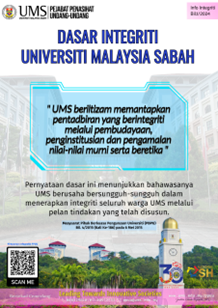
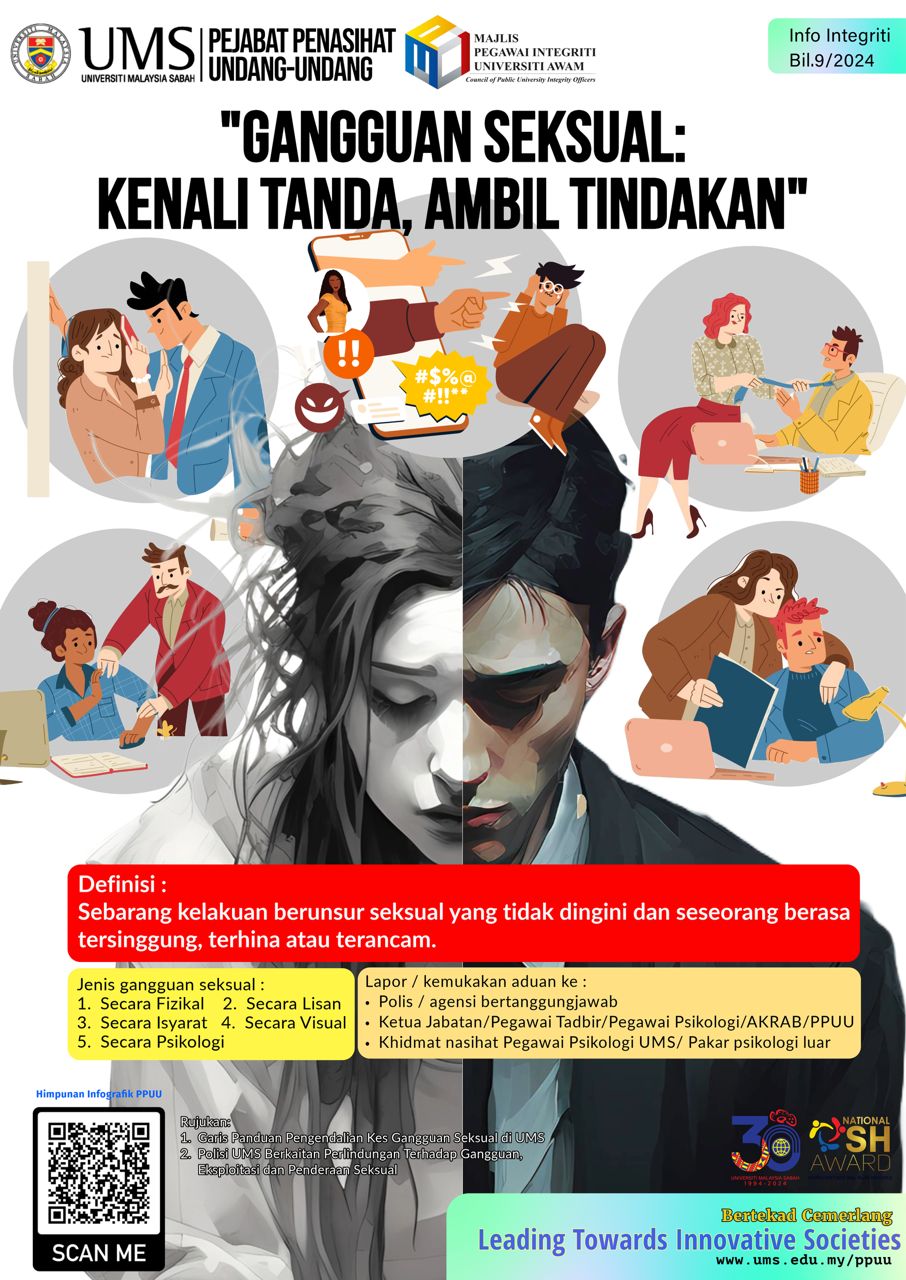
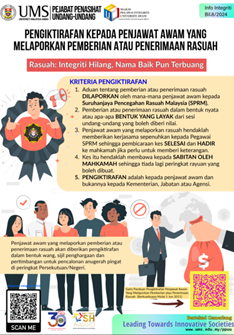

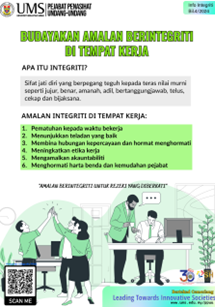
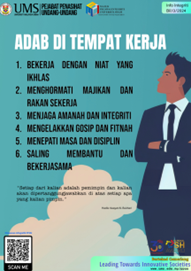
- Teaching and learning practices
- Staff performance assessments
- Co-curricular and leadership programmes
- Counselling and psychological support services
- Diversity and inclusion training
- Accessible channels for grievances and whistleblowing
- Federal Constitution (Malaysia)
- MACC Act 2009 (for anti-corruption)
- Employment and Education-related Acts
- Sustainable Development Goals (SDGs), particularly Goal 5 (Gender Equality) and Goal 10 (Reduced Inequalities)
The University periodically reviews its policies and culture-related initiatives through stakeholder feedback, internal audits, and strategic planning cycles.
Student Representation in University Governance
Universiti Malaysia Sabah (UMS) upholds the principle of inclusive and participatory governance by recognising structured student representation through three key bodies:
- Majlis Perwakilan Pelajar (MPP) – Student Representative Council
- Jawatankuasa Kolej Mahasiswa (JAKMAS) – Residential College Student Committee
- Persatuan Mahasiswa Fakulti – Faculty-based Student Associations (e.g., Mahasiswa FKI)
Majlis Perwakilan Pelajar (MPP)
The MPP is the official student parliament elected annually by the student body across faculties and campuses.
Roles and Responsibilities:
- Represent student interests at the university level.- Participate in high-level discussions, including selected senate committees, student disciplinary boards (as observers), and strategic consultations with university management.
- Advocate for student welfare, academic affairs, and campus policy improvements.
- Organise university-wide student activities and awareness campaigns on issues such as inclusivity, integrity, environmental sustainability, and public health.
Governance Involvement:
- MPP representatives are invited to sit on relevant University Management and Governance Committees.Their contributions ensure that student perspectives are incorporated into the policy-making process.
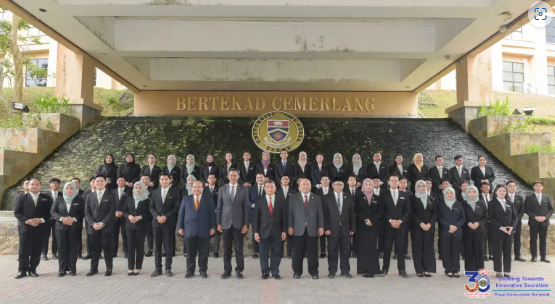
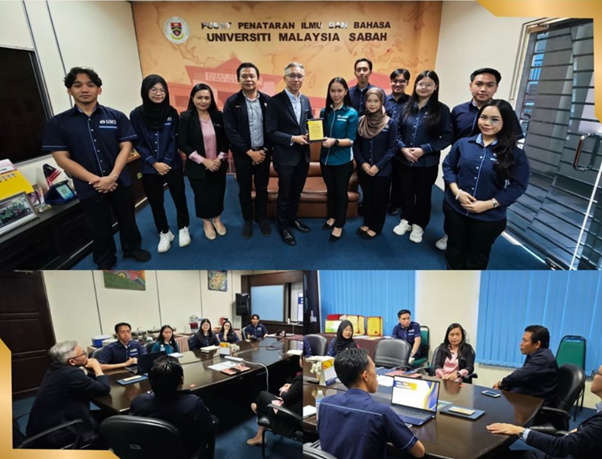
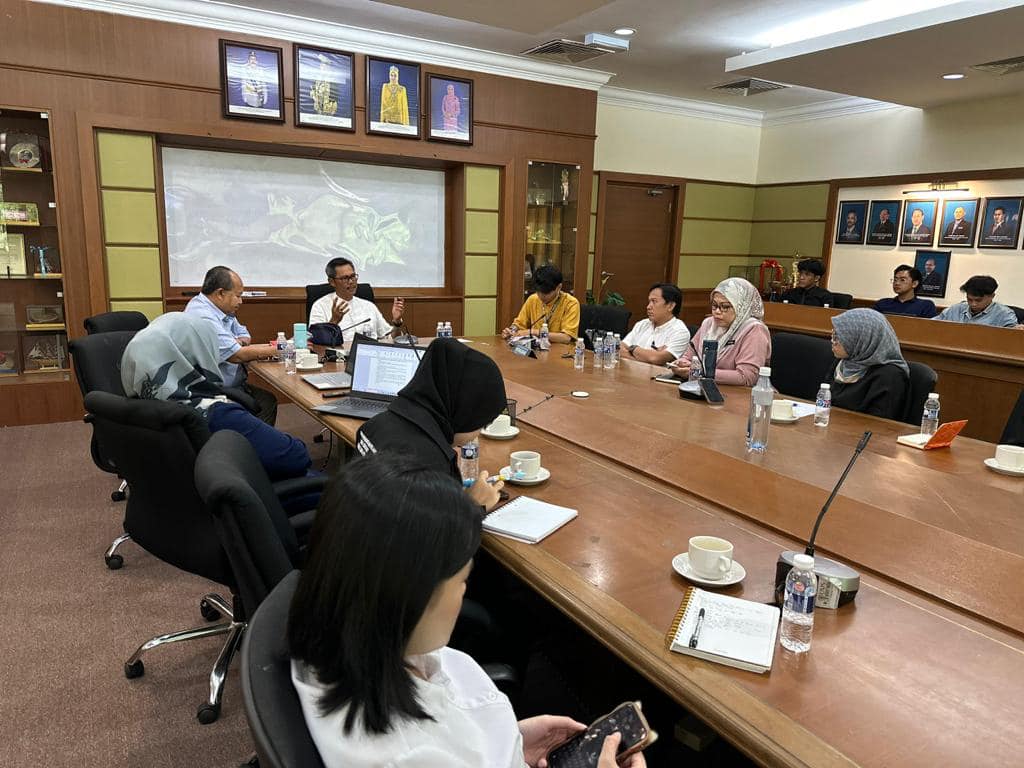

Jawatankuasa Kolej Mahasiswa (JAKMAS)
JAKMAS is the elected committee representing students residing in each residential college or hostel within UMS.
Roles and Responsibilities:
- Work closely with the Bahagian Hal Ehwal Pelajar (HEP) and college administration to address student welfare and residential life.- Plan and implement residential-based co-curricular programmes and leadership activities.
- Serve as the first point of contact for resolving issues related to accommodation, discipline, and student development at the college level.
- Promote a sense of community and inclusivity within their respective colleges.
Governance Support:
- JAKMAS plays a vital role in grassroots-level student governance, complementing MPP’s university-wide focus.They may also provide feedback and participate in committees related to student housing and campus facilities.
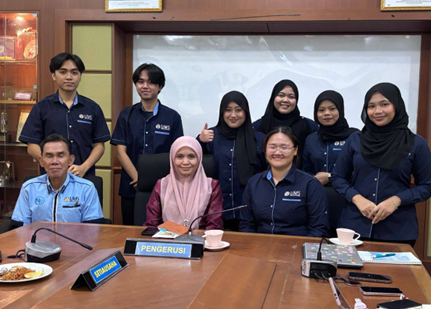
- Persatuan Mahasiswa FSSA (Faculty of Science and Natural Resources)
- Persatuan Mahasiswa FPL (Faculty of Sustainable Agriculture)
- Persatuan Mahasiswa FPP (Faculty of Psychology and Education)
- Persatuan Mahasiswa FSMP (Faculty of Food Science and Nutrition)
- Persatuan Mahasiswa FKJ (Faculty of Engineering)
- Coordinates and monitors student development programmes under the faculty
- Facilitates alumni relations and involvement in student mentoring
- Reviews and advises on issues affecting students’ academic progress, welfare, and engagement
- Aligns faculty-level student activities with UMS’s strategic goals, values, and co-curricular framework
- Highlight pressing welfare issues affecting students (e.g., financial aid, learning resources, classroom environments).
- Participate in the development of solutions or recommendations for action by the Dean’s Office or Student Affairs Division.
- Present feedback, concerns, and proposals from the wider student body.
- Ensure that student perspectives are reflected in decisions about academic support, co-curricular planning, and welfare provisions.
- Communicate decisions and initiatives from the faculty administration back to the student community.
Help foster a transparent, accountable, and collaborative culture within the faculty.
